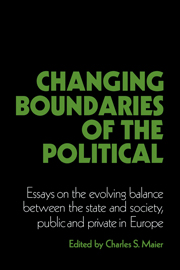 Changing Boundaries of the Political
Changing Boundaries of the Political Book contents
- Frontmatter
- Contents
- List of contributors
- Acknowledgments
- Introduction
- Part I Re-forming the political
- Part II Changing boundaries of political activity
- 5 Long waves in the development of welfare systems
- 6 Family, women, and the state: notes toward a typology of family roles and public intervention
- 7 Health care and the boundaries of politics
- 8 The politics of Wissenschaftspolitik in Weimar Germany: a prelude to the dilemmas of twentieth-century science policy
- 9 The survival of the state in European international relations
- Part III Uncertain boundaries for political economy
- Index
9 - The survival of the state in European international relations
Published online by Cambridge University Press: 05 June 2012
- Frontmatter
- Contents
- List of contributors
- Acknowledgments
- Introduction
- Part I Re-forming the political
- Part II Changing boundaries of political activity
- 5 Long waves in the development of welfare systems
- 6 Family, women, and the state: notes toward a typology of family roles and public intervention
- 7 Health care and the boundaries of politics
- 8 The politics of Wissenschaftspolitik in Weimar Germany: a prelude to the dilemmas of twentieth-century science policy
- 9 The survival of the state in European international relations
- Part III Uncertain boundaries for political economy
- Index
Summary
Europe, originator of the modern state system, has since 1945 been the principal experiment and hope for those who see a means for transforming the old state-centered model of international relations in the receding boundaries of a circumscribed and beleaguered state. In one respect – demotion of the high politics of military competition – those hopes seemed to be fulfilled through the demotion of Europe itself within the international system. The security-dependent civilian states that resulted, however, have recently faced renewed concern from their populations in an environment of deteriorating superpower relations.
In a second and equally important domain, the competition between state and international market, early predictions by the heralds of interdependence and the disciples of European integration can now be seen as overdrawn. Later cries of alarm concerning a mercantilist onslaught were equally exaggerated: The prevailing liberal organization of the international and European political economies persists, even though the activism of the state has grown in meeting the new conditions of international openness. A new and perhaps stable balance may have been struck between the postwar politics of domestic economic stabilization and the demands of international economic interdependence. At the same time, the new boundaries of the political are being subjected to strains by a perceived increase in international insecurity (and concomitant return of the concerns of traditional high politics), by shifts in the international division of labor, and by the growing inefficacy of domestic economic management in conditions of high economic openness.
- Type
- Chapter
- Information
- Changing Boundaries of the PoliticalEssays on the Evolving Balance between the State and Society, Public and Private in Europe, pp. 287 - 320Publisher: Cambridge University PressPrint publication year: 1987
- 3
- Cited by
